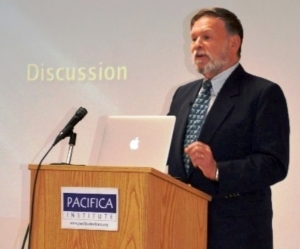The Pacifica Institute in Irvine had the pleasure of hosting an interfaith conversation with guest speaker Rabbi Larry Seidman who focused on “the beginning of religion – it happened in Turkey”. In his talk, he discussed religion, one’s interfaith work and his personal experience while visiting Turkey through Pacifica Institute just a few months ago. He began by sharing some photographs of historical landmarks he visited in Turkey and their significance towards the civilization such as the Gobekli Tepe consisting of content which he believes “is the beginning of religion, the first time people had some spiritual idea, the sense of a divine, perhaps a God concept”. Through the art on the walls, stones, and their placement around the land, a deeply thorough analysis was done by Rabbi Larry on the possibility and approach towards religion during those times. Bringing up a very crucial point, he calls attention for his audience to “understand the almost miraculous nature of doing this with no tools, no government, no domesticated animals, no pottery, only flint tools”. Rabbi Larry states the “pull of the divine [which] precedes organization, and is sense of obligation to a higher being… and urges [people] to do the right thing”.
He then goes to discuss the “specific history of the Abrahamic religions” starting with the bible. Comparing the details, Rabbi Larry looks at the Bible, the Torah, and the Koran to see the similarities and differences between the stories of Abraham. This story brought forth the “evolution from idolatry, to monotheism, to the idea of God incorporeal [which] also happened in Turkey, in Harran”. “The story of the Abrahamic religions is a story of diversifications” said Rabbi Larry. It was also a way of “abstract monotheistic” prayer, he said, because “we pray to the same God… But we differ in details” such as the names we used to say the word “God”. He states “there are many religions in existence today and many more if you count the subdivisions that share the same name”.
Rabbi Larry highlights that one of the “major developments [is] the understanding that every individual experiences the sense of the divine, the voice of God, in a different way [because] the world is changing [and] individuals are developing with different backgrounds, experiences and thoughts”. He also addresses that “rather [we] need a continuing evolution of how we understand God, and how we interact with each other in holy activities”. Rabbi Larry also brings up the topic of Tolerance from the Gulen that states “we should have such tolerance that we are able to close our eyes to faults of others, to have respect for different ideas and to forgive everything that is forgivable”. Another quote from Understanding Fetullah Gulen says “we should indeed keep the differences and learn to respect the. Each religion has its particular approach to God. But we also have a universal dimension to our traditions that we share and we must emphasize that as well”.
To conclude, Rabbi Larry discusses Claremont Lincoln University and gave a brief background on the University itself. The Claremont School of theology game together with the help of the Lincoln family and said “we all share some things like the golden, why aren’t we marketing that? Why aren’t we developing that, [Instead] of developing hatred” Provides the “chance to learn and study our religions strongly but also gives us an opportunity to learn about each other’s religions. And understand what the differences are, and what the ideas are, and how we fit in that”. Rabbi Larry closes his discussion with an emphasis of encouragement towards interfaith dialogues amongst the many religions because “everyone is God’s creation, everyone has a connection to God, to the divine, to the understanding of the universe that surround us”.

